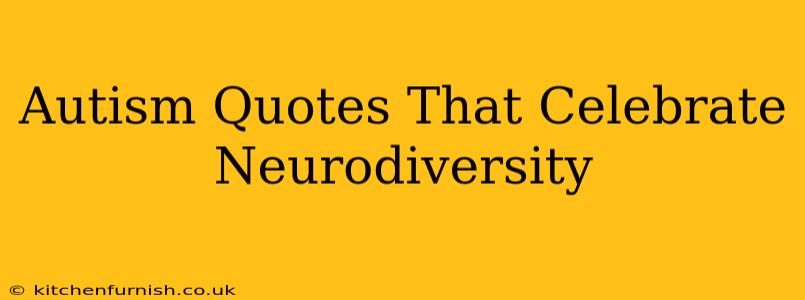Autism, a neurological condition affecting communication and social interaction, is increasingly understood through the lens of neurodiversity. This perspective shifts the focus from deficit to difference, celebrating the unique strengths and talents of autistic individuals. Instead of viewing autism as something to be "cured," neurodiversity emphasizes acceptance and inclusion. This article explores powerful quotes that encapsulate this celebratory and empowering approach to autism. We’ll also delve into some frequently asked questions surrounding neurodiversity and autism.
What is Neurodiversity?
Neurodiversity is a social model that suggests that neurological differences like autism, ADHD, dyslexia, and others are natural variations in the human brain. It promotes the idea that these differences are not deficits but rather different ways of thinking and experiencing the world. Instead of attempting to "fix" these differences, the neurodiversity paradigm advocates for creating environments that are inclusive and accommodating to all neurological profiles. This fosters a more equitable and accepting society where everyone can thrive.
Powerful Autism Quotes Celebrating Neurodiversity
Several impactful quotes beautifully capture the essence of neurodiversity and its relevance to the autistic community. Here are a few examples:
-
"If you've met one person with autism, you've met one person with autism." This often-cited quote highlights the vast spectrum of autistic experiences. There is no single, uniform presentation of autism; each individual's experience is unique and profoundly personal.
-
"Autism is not a disease to be cured, but a different way of being." This emphasizes the core tenet of neurodiversity – that autism is not a medical problem to be solved, but a natural variation of human neurology.
-
"Neurodiversity: The beautiful mosaic of human brains." This analogy captures the richness and variety inherent in neurological differences. Just as a mosaic is composed of diverse tiles creating a stunning whole, a neurodiverse society is enriched by the contributions of individuals with diverse neurological profiles.
-
"Embrace the differences. Celebrate the unique talents and perspectives." This quote serves as a call to action, encouraging us to appreciate the individual strengths and talents that are often associated with autism.
Frequently Asked Questions about Autism and Neurodiversity
Here, we address some commonly asked questions surrounding autism and neurodiversity:
What are the benefits of embracing neurodiversity?
Embracing neurodiversity benefits society as a whole. By creating inclusive environments, we tap into the unique talents and perspectives of autistic individuals, fostering innovation and creativity. It also promotes a culture of acceptance and understanding, reducing stigma and discrimination. Autistic individuals often possess exceptional skills in areas like pattern recognition, detail-oriented thinking, and problem-solving.
How can we create more neurodiverse-friendly environments?
Creating a neurodiverse-friendly environment involves understanding the sensory sensitivities and communication styles of autistic individuals. This may involve minimizing sensory overload (reducing bright lights, loud noises), providing clear and concise communication, and offering flexible work arrangements or educational settings. It’s crucial to involve autistic individuals in the process of designing these inclusive environments.
Is neurodiversity just about autism?
While autism is a significant focus within the neurodiversity movement, it encompasses a wide range of neurological differences, including ADHD, dyslexia, dyspraxia, Tourette syndrome, and others. The underlying principle is that these conditions are variations, not deficits, and should be celebrated and accommodated.
How can I learn more about neurodiversity?
There are many resources available to learn more about neurodiversity. Organizations such as the Autistic Self Advocacy Network (ASAN) and similar groups offer valuable information, support, and advocacy. Books, articles, and documentaries on the topic can also provide further insights.
Conclusion: Celebrating the Autistic Spectrum
The quotes presented here, and the growing acceptance of neurodiversity, represent a significant shift in how we understand and interact with autism. By embracing the unique strengths and perspectives of autistic individuals, we create a richer, more inclusive, and ultimately, more innovative society. Remember, neurodiversity isn't about fixing what's "wrong," but about celebrating what's different.

